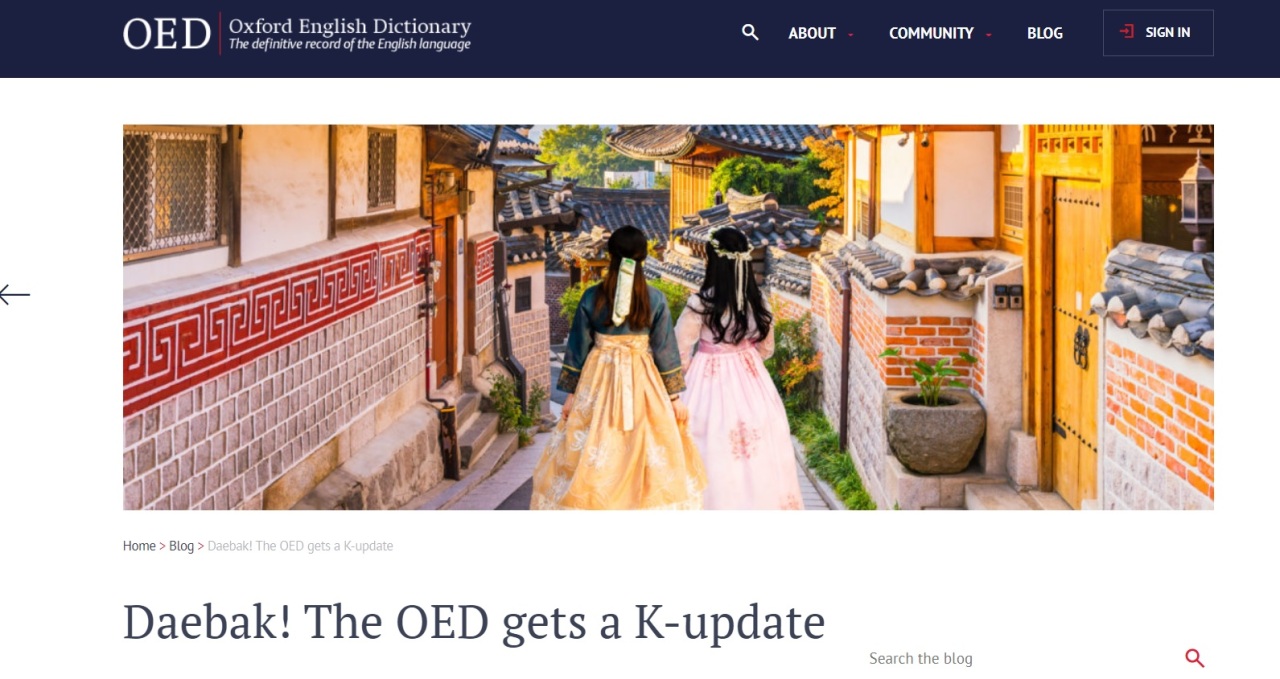More Korean words make it into Oxford English Dictionary
By Lee Si-jinPublished : Oct. 8, 2021 - 17:58

Thanks to the soaring popularity of Korean culture, 26 words and phrases of Korean origin have been included in the latest update to the Oxford English Dictionary.
The dictionary was first published in 1884, and the word “Korean” was first added in a 1933 supplement.
Food features prominently in the recent update: Banchan are small side dishes served along with rice as part of a typical Korean meal. Bulgogi is a dish consisting of thin slices of beef or pork, which are marinated and then grilled or stir-fried.
Dongchimi refers to white kimchi, made with radish and typically also containing napa cabbage. Galbi refers to beef short ribs, marinated in soy sauce, garlic and sugar, and then cooked on a grill at the table.
Japchae refers to cellophane noodles made from sweet potato starch, usually stir-fried with vegetables and other ingredients, and seasoned with soy sauce and sesame oil. Kimbap is a Korean dish consisting of cooked rice and other ingredients wrapped in a sheet of seaweed and cut into bite-sized slices. Samgyeopsal is a dish of thinly sliced pork belly, usually cooked by the diner on a tabletop grill.
Kimchi, the most iconic Korean dish of all, was added to the dictionary in 1976.
Another notable new food term is “chimaek,” meaning fried chicken and beer. The hybrid word became popular when South Korean actor Jun Ji-hyun used it in the global hit drama “My Love From the Star” (2014). The show started a Korean fried chicken craze in many Asian countries where the show was a huge hit, including China.
Words depicting traditional Korean culture have also been added, including the traditional Korean costume, hanbok; Korean martial arts Tang Soo Do and taekwondo; and sijo, a classical Korean vocal music genre used to perform classical poems also called sijo.
Various aspects of Korean culture are reflected in terms such as “aegyo” -- used to describe the charm and cuteness considered characteristically Korean -- the Korean cartoon genre “manhwa” and “mukbang,” a type of video where someone eats on camera while interacting with the audience. The dictionary defines “daebak” as an interjection used to express enthusiasm, like “fantastic” or “amazing.”
The global popularity of Korean movies and dramas led the dictionary to include certain honorifics and forms of address used in Korean: noona, oppa and unni. Noona is used when a male speaker is addressing his older sister or an older female friend, while oppa is used by a female speaker in addressing or referring to an older brother or an older male friend. Unni is used when a female speaker is referring to her older sister or older female friend.
According to the Oxford, the work of defining the Korean words in English was undertaken by the dictionary’s editors and organizations concerned with the Korean language. These included the National Institute of Korean Language, the National Library of Korea and Korea University.
By Lee Si-jin (sj_lee@heraldcorp.com)








![[KH Explains] Hyundai's full hybrid edge to pay off amid slow transition to pure EVs](http://res.heraldm.com/phpwas/restmb_idxmake.php?idx=644&simg=/content/image/2024/04/18/20240418050645_0.jpg&u=20240419100350)







![[From the Scene] Monks, Buddhists hail return of remains of Buddhas](http://res.heraldm.com/phpwas/restmb_idxmake.php?idx=652&simg=/content/image/2024/04/19/20240419050617_0.jpg&u=20240419175937)

![[KH Explains] Hyundai's full hybrid edge to pay off amid slow transition to pure EVs](http://res.heraldm.com/phpwas/restmb_idxmake.php?idx=652&simg=/content/image/2024/04/18/20240418050645_0.jpg&u=20240419100350)

![[Today’s K-pop] Illit drops debut single remix](http://res.heraldm.com/phpwas/restmb_idxmake.php?idx=642&simg=/content/image/2024/04/19/20240419050612_0.jpg&u=)